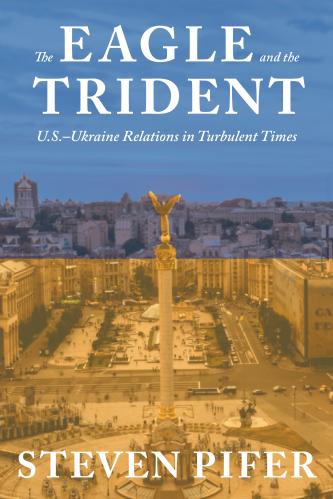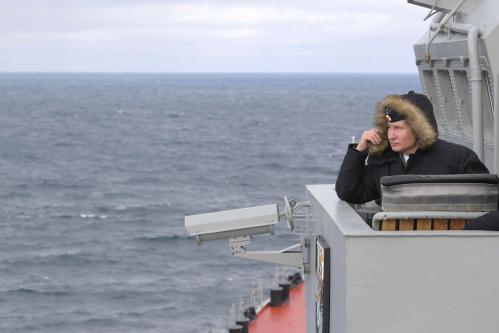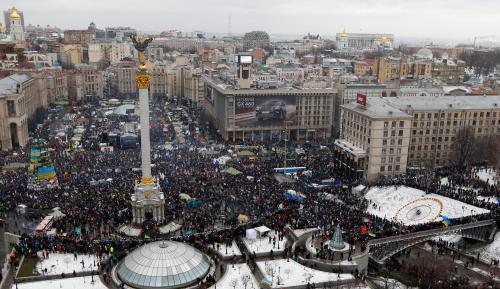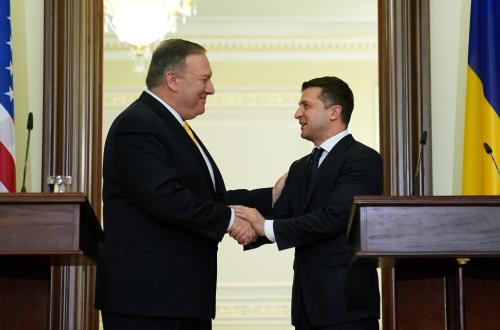In March, Ukrainian President Zelenskiy fired his prime minister and reshuffled his cabinet, the Rada was torn between confronting COVID-19 and completing preconditions for the next IMF program, and controversy flared over the Donbas, writes Steven Pifer. This post was originally published on the Stanford CISAC website.
Ukrainians rode a wild roller coaster in March. President Volodymyr Zelenskiy began the month by firing the prime minister and reshuffling the cabinet, prompting concern that oligarchs were reasserting their influence. COVID-19 and its dire economic implications, however, refocused attention. At the end of the month, the Rada (Ukraine’s parliament) passed on first reading legislation key to securing low-interest credits from the International Monetary Fund.
Meanwhile, controversy flared over the Donbas. A March 11 agreement reached by Zelenskiy’s chief of staff broke a long-standing Ukrainian position by giving status to the so-called Donetsk and Luhansk “people’s republics” — the parts of Ukraine’s eastern region of Donbas occupied by Russian and Russian proxy forces. It is unclear if Kyiv will go forward with the agreement.
Cabinet Reshuffle
On March 4, Prime Minister Oleksiy Honcharuk resigned at Zelenskiy’s request. Honcharuk and his cabinet were widely viewed as inexperienced but honest and pro-reform. Only in office for six months, Honcharuk’s team did not have time to achieve much of its ambitious agenda.
The new prime minister, Denys Shmyhal, brought little in the way of a national reputation, and the new cabinet lacks the reformist sheen of its predecessor. Few took Zelenskiy’s reason for the reshuffle — the cabinet’s supposed ineffectiveness — at face value. Some speculated that falling approval ratings provided the real motive. Others wondered whether this signified Zelenskiy’s shedding the pro-reform, anti-corruption persona that won him the top job in 2019 and feared a return to the country’s unfortunate tradition of quiet government dealings with oligarchs.
Reformers became more depressed on March 5 when Prosecutor General Ruslan Riaboshapka was fired for refusing to investigate Petro Poroshenko, Zelenskiy’s predecessor. Riaboshapka had a sterling reputation. His replacement has never served as a prosecutor, is personally close to Zelenskiy, and ran on his party’s parliamentary ticket. Her appointment raises doubts about the independence of the prosecutor general’s office.
The timing of the reshuffle — just as Kyiv sought to secure a new $5.5 billion agreement with the IMF — puzzled many. Departing Finance Minister Oksana Makarova had made significant progress in negotiations with the IMF, but her immediate successor, Ihor Umanskiy, questioned the value of working with the Fund.
Back on Track, at least with IMF?
The newly appointed prime minister spent the month stressing the importance of securing the IMF program. While he expressed his readiness to travel to Washington to meet the Fund’s leadership, the IMF told Kyiv to first complete two key preconditions.
One was Rada passage of a banking law that would prevent former owners whose banks had been nationalized from regaining ownership. This targeted oligarch Ihor Kolomoisky, a former owner of PrivatBank. After a 2016 audit revealed PrivatBank’s accounts were short $5 billion, the government nationalized it and made good the missing funds. However, Kolomoisky recently suggested legal action to regain ownership or compensation, a deal-breaker for the IMF.
Kolomoisky has a link to the president, as he owns the television network that broadcast the comedy show in which Zelenskiy played a common man suddenly thrust into the presidency. How the government handles the ownership of PrivatBank has become a litmus test for Zelenskiy.
The second issue was Rada passage of an agricultural reform bill that would lift a moratorium on the sale of agricultural land. Ukraine has 30 percent of the world’s black earth, and the agricultural sector represents a bright spot in the economy. But the prohibition on land sales denied private farmers the ability to use their land as collateral to secure loans to buy better seed, fertilizer and equipment.
While the Rada debated these measures in March, the rising number of COVID-19 cases and looming economic downturn focused attention on the need for the IMF program. On March 30, the Rada sacked Umanskiy, replacing him with a new minister with established reform credentials, and replaced the minister of health as well. It then approved, on first reading, the banking and agricultural land reform laws.
The Rada has not satisfied the IMF completely, but March closed with Ukraine seemingly on track to secure its IMF program and suggestions that the Fund might make available more than $5.5 billion. The vote on the banking law suggests a major break between the president and Kolomoisky, although doubts persist about Zelenskiy’s commitment to reform. In any case, Kyiv will be swamped by the challenges of managing simultaneous health and economic crises.
Donbas Controversy
Domestic developments did not grab all of the March headlines. A March 11 agreement regarding the Minsk Trilateral Contract Group (TCG) became a major point of contention in Kyiv. The TGC consists of officials of Ukraine, Russia and the Organization for Security and Cooperation in Europe, with representatives of the so-called Donetsk and Luhansk “people’s republics” attending as unofficial “invitees.” It has met for five years but has registered little progress toward implementing the objectives of the 2015 Minsk II agreement: ending the fighting and restoring Ukrainian sovereignty over all of Donbas.
Andriy Yermak, the president’s chief of staff, sought to shake up the chessboard and tentatively agreed to a subgroup reporting to the TCG that would include equal numbers of representatives from Ukraine and of the occupied territory, with German, French, OSCE and Russian officials sitting in as observers. The details leaked and provoked an immediate furor.
First, the subgroup was seen to give status to the two “people’s republics,” something Kyiv has carefully avoided over the course of the six-year-long conflict. Second, by putting Russia on par with Germany, France and the OSCE, the agreement seemed to accept Moscow’s narrative that Russia is not a party to the conflict and that it is a civil war — despite the fact that Russian and Russian proxy forces occupy parts of Donetsk and Luhansk.
More broadly, critics saw no sign that the Kremlin, which still pulls the strings in occupied Donbas, had decided to end the conflict.
Officials close to the president asserted that the new subgroup would be consultative in nature. They said the Ukrainian government would select 10 members for the subgroup. Of the ten to speak for the occupied territories, five would come from the ranks of internally-displaced persons who have left occupied Donbas — and Kyiv would influence who was chosen. Ukrainian officials argued that this would be a favorable make-up (Kyiv picking fifteen of the twenty Ukrainian participants) and, in any case, the subgroup would only make recommendations to the TCG, not take decisions.
The new format poses risks, which officials acknowledge. By the end of March, Kyiv seemed to have second thoughts, and the agreement was not signed on March 25, as had been planned.
March was tough for Zelenskiy, and April may prove even more challenging. The month began with the president and his government trying to come to grips with COVID-19 and an economy tipping toward recession, tempered by hope that Ukraine can manage the final steps necessary to secure an IMF program. Battered over the TGC gambit, it is possible Kyiv will let the idea for a new subgroup die quietly. As he nears the end of his first year as president, Zelenskiy, who came to the office a political neophyte, is finding just how difficult governing — for real, not in a television comedy show — can be.
The Brookings Institution is committed to quality, independence, and impact.
We are supported by a diverse array of funders. In line with our values and policies, each Brookings publication represents the sole views of its author(s).









Commentary
March was a roller coaster month for Ukraine
April 6, 2020